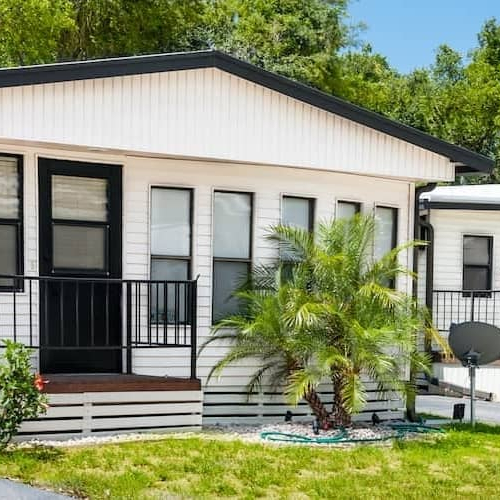Condo vs. co-op: Pros, cons and major differences
May 14, 2024
•8-minute read
Two of the more popular types of housing in America are condominiums (condos) and housing cooperatives (co-ops). While they may appear similar at first glance, condos and co-ops can differ greatly in costs, amenities, ownership and other details.
Knowing the main differences between condos and co-ops will help you decide which type of housing is right for you.
What’s the difference between a condo and a co-op?
A condo is a privately owned piece of real estate within a larger building. When you purchase a condo, you own your individual unit outright. The common areas of the building, such as the lobby, pool and gym, are owned jointly by all unit owners and managed by the condo association.
On the other hand, a housing co-op is a type of residence in which owners hold shares in a corporation that owns a building rather than owning the real estate itself.
Here’s a rundown of the key distinctions between condos and co-ops.
Ownership
The main difference between a condo and a co-op lies in how ownership of each property works. A condo is an owned private residence located inside a shared building. While a co-op is also contained within a larger structure, its residents don’t actually own their living spaces but rather have proprietary leases, giving them the right to live in the property until they sell or transfer their shares.
When you buy a condo, you receive a deed to the new home like you would if you bought a single-family home. However, you only own the interior of your property. The condo association owns the exterior of your condo and also handles most exterior maintenance and repairs.
If you buy into a co-op, the property belongs to everyone who lives within it. If you own more shares, you own a larger percentage of the corporation and may be entitled to a larger living space within the co-op. Every shareholder splits maintenance fees, taxes, repair costs and property management fees.
Governance
As we mentioned, condos are typically run by condo associations, which function similarly to homeowners associations (HOAs). These associations handle maintenance issues and create bylaws for the community to follow concerning such details as the types of pets condo owners can have, quiet hours and use of common areas. It’s important to know the rules of the condo association before you move in.
Co-ops operate in a more businesslike manner. As with a publicly traded company, every co-op shareholder gets to vote on issues that affect tenants. Co-ops usually elect a board of members to collect fees and maintain items like common spaces. The co-op might also vote to hire a property management company to handle the day-to-day workings of the building.Pricing and market value
Determining the fair market value of a condo is similar to determining the market value of a single-family home. The condition of your condo and the values of other residences nearby can influence its fair market value. An appraiser can give you an estimate of how much your condo is worth.
As for co-ops, two main types of valuations are considered: market rate and limited equity. The process differs between these types.
In a market rate co-op, you can determine your co-op’s value in essentially the same way you would for a condo or single-family home. An appraiser takes current market conditions into account and determines how much your shares of the co-op are worth. You can sell your co-op shares for whatever price the market will bear.
In a limited equity co-op, you’re limited in how much you can gain in equity from your shares. In some instances, you may earn $0 in equity due to co-op rules that limit how much you can sell your shares for. These types of co-op rules are usually put in place to provide affordable housing below market rates. Make sure you and other shareholders understand the equity rules before you try to sell a co-op.
Financing
While both property types may allow for financing, there are some key differences to note.
Condos are typically easier to finance because the owner will have physical property as collateral. This also means that as a prospective buyer, you can make a lower down payment, as low as 3%, depending on your financing.
In contrast, a co-op owner is buying shares of the corporation that owns the property. As such, getting approved for a loan to purchase a co-op can be more difficult or outright impossible if the co-op’s board forbids financing.
Lenders that do offer co-op loans only offer financing to market rate co-ops in specific markets, because this structure allows them to ensure the home buyer gains equity as they make payments, protecting the investment. Some lenders may even require a larger than normal down payment, and they will want to know about the structure of the co-op and its board of directors.
Closing costs and taxes
When you purchase any type of property, certain closing costs and taxes come along with it.
For a condo, these will be slightly different from what you’ll encounter when buying a co-op. For example, if you’re closing on a condominium, you should expect to pay:
- Property taxes
- Title insurance
- Appraisal fees
- Inspection fees
When you buy a co-op, on the other hand, you won’t have to pay for mortgage insurance, and property taxes. Instead, they’re rolled into your monthly co-op administration fees. Other fees like REALTOR® commission and transfer taxes, however, remain your responsibility.
Renting and selling
Condos and co-ops rely heavily on rules and regulations of who can occupy a property, though those of condos are typically much more relaxed.
If you live in a condo, you’ll most likely have the option to rent out or sublet your property to tenants. You’ll be responsible for conducting background checks and ensuring your renters follow the rules in your community’s bylaws. You can also sell your condo at any time, provided there are no restrictions in your contract or community guidelines.
Co-op apartments often forbid renting and can be difficult to sell because each sale must be approved by the board of directors. Even after you find a buyer accepted by the co-op, you’ll likely have to pay a transfer fee when you sell your shares.
Amenities
Amenities are a big draw for both condos and co-ops. These can include gyms, green space, laundry facilities and pools, all managed by the building owners. Condos tend to have more amenities.
Co-ops can offer similar amenities, but the co-op board is responsible for management and upkeep. Since board members are also residents, this can create greater interest in maintaining and improving the quality of life within the building.
Co-ops also empower boards to make decisions that reflect the wishes of the majority of shareholders. This may help some initiatives get pushed through that may have otherwise resulted in disagreements or discord between owners.
Rules and regulations
Both condos and co-ops have rules. But how strict the rules are, who writes the rules and how easy it is to change the rules may differ significantly between the two property types.
Condos offer more freedom, in a sense. While there may be a basic outline provided when a building is completed, owners come together and determine what rules to add or take away. In some cases, not everyone will agree on a rule change, and owners will have to rely more on diplomacy to get things done.
In co-ops, the board is responsible for managing and enforcing the rules of the building. Though the board makes decisions based on shareholders’ wishes, there may be more bureaucracy involved in pushing changes through the pipeline.
Recurring fees
In a condo, you’ll be responsible for paying monthly association dues. These go toward maintaining the common areas and amenities and paying for any needed repairs or renovations. A portion of the fees may also be allocated to a reserve fund, or savings account, for larger expenditures, like fixing a broken elevator or draining a flooded parking lot. In some cases, you may also be responsible for property taxes on your unit.
Co-op fees also cover many of these expenses, though they include property taxes, utilities and insurance. One of the advantages of living in a co-op, however, is that the corporation is ultimately responsible for any major issues.
Application process
You usually don’t need to participate in any interview before buying a condo. Even if your condo association sets strict rules on how you can use your property, it doesn’t control who moves into any unit in the association.
Buying a co-op, on the other hand, typically requires an application process. Prospective buyers will have to be approved by board members before they’re able to buy shares in the co-op. The board approval process can include personal interviews and a review of your financial documentation, like a mortgage lender would.
As with a single-family home purchase, getting preapproved is a good first step when buying a condo or a co-op.
Availability
Condos are widely located in most major cities, suburban areas and some small towns.
Co-ops are a little less widely available. They’re mostly found in larger metropolitan areas like New York City, Seattle, or Philadelphia.
Home buyers looking to live in less populated areas would have more luck finding condos as housing options.Condo vs. co-op: Pros and cons
Whether you’re buying a condo or a co-op, you should choose the home that suits your situation and living preferences. Consider the benefits and drawbacks of each housing option to better decide where you should live.
Condos
Condos allow you to own your living space but not the entire building around it. Here are some other pros and cons of condos as compared to co-ops.| Upsides of condos | Downsides of condos |
|---|---|
| Ownership of real estate | Higher closing costs and taxes |
| Ease of refinancing | Limited supply and higher prices in some markets |
| Few or no usage restrictions | Monthly condo association fees |
| Many new builds | No control over neighbors |
| Sense of privacy and independence |
Co-ops
Co-ops can be very community-based but harder to get into than condos. Here’s what else you may or may not like about co-op living as compared to condos.| Upsides of co-ops | Downsides of co-ops |
|---|---|
| Lower purchase price | Potentially expensive fees |
| Sense of community and long-term housing security | Rigorous application process |
| Limited responsibilities for shared spaces | Inconsistent ability to finance |
| Robust amenities | Restrictions on usage, such as the inability to rent space out |
| Other tenants invested in respecting shared spaces | Requirement of finding a board-approved buyer when selling |
Should you buy a condo or a co-op?
If you value privacy and independence, then a condo may be the option for you. Conversely, a co-op might be the way to go if you’re looking for a sense of community and a more hands-off approach to decision-making in the building. Ultimately, it’s important to weigh all of your options carefully before making a decision.
Here is a quick flowchart to help you determine which option might be best for you:
Condo vs. co-op FAQs
Choosing between a condo and a co-op can be a difficult choice. Here are a few FAQs that may help you make a decision:
Which has higher fees? A condo or a co-op?
Fees will vary depending on the condo or co-op, what amenities are provided in the respective buildings and the location of the condo or co-op. That said, if a condo or co-op both provide similar amenities and services and are in the same city, a co-op will likely require higher monthly fees, as the fees will include property taxes and other charges unique to co-ops.
Is a condo or co-op a better investment?
Both condos and co-ops can be good investments but for different reasons. Co-ops are often seen as safer and more stable investments. This may mean that though they don’t provide the same upside or potential to earn passive income, they’ll likely retain and grow their value over time.
Is a condo or co-op more affordable?
Condos may come with a higher initial price tag, but lower monthly fees and better financing options may make them more attractive for buyers who don’t have a large monthly budget or haven’t saved a large down payment amount.The bottom line: Both condos and co-ops come with pros and cons
Deciding between a condo and a co-op can come down to how you want to use your space. Do you want complete ownership of your unit, or would you enjoy a community-based living situation where you have a say in the building at large? Think about what you want out of a home, but also consider the drawbacks of both living situations.
Ready for homeownership but need financing? Start the process today with Rocket Mortgage®.

Carla Ayers
Carla Ayers is former section editor for Rocket Homes and is a Realtor® with a background in commercial and residential property management, leasing and arts management. She has a Bachelors in Arts Marketing and Masters in Integrated Marketing & Communications from Eastern Michigan University.
Related resources

8-minute read
Multifamily investing 101: How to buy multifamily homes
Are you interested in multifamily investing? Learn the reasons to invest in multifamily real estate, your loan options and how to buy a multifamily property.
Read more
6-minute read
Modular vs. manufactured homes: What's the difference?
Modular and manufactured homes are both factory-built, but they have some key differences. Uncover the distinctions between modular and manufactured homes.
Read more

9-minute read
Manufactured homes: Defined and explained
Manufactured homes are made, piece by piece, within factories, then assembled on-site. Here’s how much they cost and what you should know before you buy o...
Read more